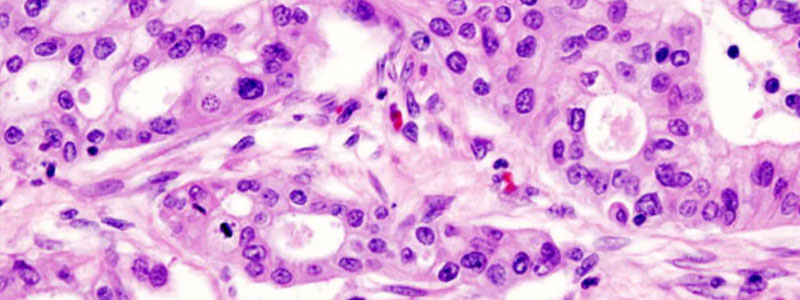Risk Factors for Pancreatic Cancer
One of the most aggressive forms of cancer develops in the pancreas, an organ that secretes enzymes that aid digestion and hormones that regulate the metabolism of sugars in the human body.
While the exact catalyst of pancreatic cancer is not yet fully understood, research suggests that certain risk factors may contribute to the likelihood of developing this devastating cancer. Learn more below about pancreatic cancer and the risk factors that likely aid in its growth.

Pancreatic Cancer Risk Factors
- Family History & Age: Multiple studies suggest that if several first-degree relatives have pancreatic cancer, especially if those diagnosed were under 50 at the time, then the risk increases dramatically.
- Diet: A diet that is high in red and processed meats has been shown to increase the risk of pancreatic cancer. However, people who consume more fruits and vegetables had a markedly lower risk of acquiring the disease.
- Weight/Obesity: When compared to people of a normal, healthy weight, those struggling with issues related to obesity have a 20% higher chance of contracting pancreatic cancer.
- Race: While no one is really safe when it comes to pancreatic cancer, African Americans and Ashkenazi Jews have a higher incidence of the disease.
- Gender: In general, more men than women are diagnosed with pancreatic cancer. Further, there are studies that indicate a gender difference in survival rates among pancreatic cancer patients.
- Smoking: About 25% of pancreatic cancers are thought to be caused by cigarette smoking.
- Diabetes: People with diabetes are at a greater risk of developing pancreatic cancer. The risk is most often found in people with type 2 diabetes; there is not enough data to demonstrate whether or not people with type 1 diabetes are also at a higher risk.
- Pancreatitis: Chronic pancreatitis – or the inflammation of the pancreas – increases the risk of pancreatic cancer, and those with hereditary pancreatitis have an even higher risk.
Have you been diagnosed with pancreatic cancer?
Pancreatic cancer is extremely deadly. Although its incidence in the United States is relatively low (estimated new cases in 2019 is 56,770), the 5-year survival rate is only 9.3%. Pancreatic cancer became the third leading cause of cancer-related deaths in 2016 and is expected to be the second leading cause of death after 2020. Cornerstone Pharmaceuticals’ CPI-613® (devimistat) is currently undergoing Phase III clinical trials for metastatic pancreatic cancer. Their goal is to provide a viable treatment option for those suffering from pancreatic cancer. Learn more about Cornerstone Pharmaceuticals’ Pancreatic Cancer Clinical Trial.
